More than half of people with mental illness don't receive help for their disorders. Often, people avoid or delay seeking treatment due to concerns about being treated differently or fears of losing their jobs and livelihood. That's because stigma, prejudice and discrimination against people with mental illness are still very much a problem.
Stigma, prejudice and discrimination against people with mental illness can be subtle or obvious—but no matter the magnitude, they can lead to harm. People with mental illness are marginalized and discriminated against in various ways, but understanding what that looks like and how to address and eradicate it can help.
The Facts on Stigma, Prejudice and Discrimination
Stigma often comes from lack of understanding or fear. Inaccurate or misleading media representations of mental illness contribute to both those factors. A review of studies on stigma shows that while the public may accept the medical or genetic nature of a mental health disorder and the need for treatment, many people still have a negative view of those with mental illness.
Researchers identify different types of stigma: (See chart below.)
- Public stigma involves the negative or discriminatory attitudes that others may have about mental illness.
- Self-stigma refers to the negative attitudes, including internalized shame, that people with mental illness may have about their own condition.
- Structural stigma is more systemic, involving policies of government and private organizations that intentionally or unintentionally limit opportunities for people with mental illness. Examples include lower funding for mental illness research or fewer mental health services relative to other health care.
Stigma not only directly affects individuals with mental illness but also the loved ones who support them, often including their family members.
Stigma around mental illness especially an issue in some diverse racial and ethnic communities and it can be a major barrier to people from those cultures accessing mental health services. For example, in some Asian cultures, seeking professional help for mental illness may be counter to cultural values of strong family, emotional restraint and avoiding shame. Among some groups, including the African American community's, distrust of the mental healthcare system can also be a barrier to seeking help. (See more on mental health in Diverse Populations.)
Types of Stigma
| Public | Self | Structural | |
|---|---|---|---|
| Stereotypes & Prejudices | People with mental illness are dangerous, incompetent, to blame for their disorder, unpredictable | I am dangerous, incompetent, to blame | Stereotypes are embodied in laws and other institutions |
| Discrimination | Therefore, employers may not hire them, landlords may not rent to them, the health care system may offer a lower standard of care | These thoughts may lead to lowered self-esteem and self-efficacy: "Why try? Someone like me is not worthy, or unable to work, live independently, or have good health." | Leads to intended and unintended loss of opportunity |
Source: Adapted from Corrigan, et al., 2014.
Media representations of people with mental illness can influence perceptions and stigma, and they have often been negative, inaccurate or violent representations. A study published by Scarf, et. al. in 2020 looked at a recent example, the popular film Joker (2019), which portrays the lead character as a person with mental illness who becomes extremely violent. The study found that viewing the film "was associated with higher levels of prejudice toward those with mental illness." Additionally, the authors suggest, "Joker may exacerbate self-stigma for those with a mental illness, leading to delays in help seeking."
The stigma of mental illness is universal. A 2016 report on stigma concluded "there is no country, society or culture where people with mental illness have the same societal value as people without mental illness."
Harmful Effects of Stigma and Discrimination
Stigma and discrimination can contribute to worsening symptoms and reduced likelihood of getting treatment. A recent extensive review of research found that self-stigma leads to negative effects on recovery among people diagnosed with severe mental illnesses. Effects can include:
- reduced hope
- lower self-esteem
- increased psychiatric symptoms
- difficulties with social relationships
- reduced likelihood of staying with treatment
- more difficulties at work
A 2017 study by Oexle et al involving more than 200 individuals with mental illness over a period of two years found that greater self-stigma was associated with poorer recovery from mental illness after one and two years.
An editorial in the Lancet notes that the impacts of stigma are pervasive, affecting political enthusiasm, charitable fundraising and availability, support for local services and underfunding of research for mental health relative to other health conditions.
Some of the other harmful effects of stigma can include:
- Reluctance to seek help or treatment and reduced likelihood of staying with treatment.
- Social isolation.
- Lack of understanding by family, friends, coworkers, or others.
- Fewer opportunities for work, school or social activities or trouble finding housing.
- Bullying, physical violence or harassment.
- Health insurance that doesn't adequately cover your mental illness treatment.
- The belief that you'll never succeed at certain challenges or that you can't improve your situation.
Source: Adapted from Mayo Clinic 2017
Stigma Can Also Impact Family and Friends
Family members and friends, who often provide essential help and support for people with mental illness, can also experience stigma. They may internalize stigma and blame themselves, or they may fear that people will blame them for causing a loved one’s illness or reject the family socially. This stigma can lead to reduced emotional support, social isolation, and reluctance to seek care for their relative. (Yanos, 2023; Mclean, 2023)
Stigma in Diverse Communities
Stigma around mental illness is especially an issue in some diverse racial and ethnic communities, and it can be a major barrier to people from those cultures accessing mental health services. For more information, please see Mental Health Disparities: Diverse Populations.
Stigma in the Workplace
A 2022 national poll from the American Psychiatric Association (APA) found that mental health stigma is still a major challenge in the workplace. About half (48%) of workers say they can discuss mental health openly and honestly with their supervisor, down from 56% in 2021 and 62% in 2020. Half (52%) also say they feel comfortable using mental health services with their current employer, compared to 64% in 2021 and 67% in 2020. In a more positive trend, fewer adults are worried about retaliation if they take time off or seek care for their mental health. About one in three (36%) worried about retaliation if they took time off, compared to 48% in 2021 and 52% in 2020. Less than one-third (31%) were worried about retaliation for seeking care, compared to 43% in 2021 and 2020. (APA, 2022)
Reducing Stigma
Public Health Approaches
Many years of research on anti-stigma interventions has found that successful interventions (Yanos, 2023):
- Include contact (in person, but video can also be a feature if done right).
- Focus on a range of disorders, not just depression or mental illness broadly.
- Involve participation of people with “lived experience.”
- Target groups that have the most interaction or where lack of help-seeking is most problematic (e.g., young people, undocumented communities, military communities).
- Are tailored to be credible to specific language and cultural signifiers of the target group.
- Last several years in order to be effective.
Substantial research shows that knowing or having contact with someone with mental illness is one of the best ways to reduce stigma. Individuals speaking out and sharing their stories can have a positive impact. When we know someone with mental illness, it becomes less scary and more real and relatable.
Teens are searching for health information online and mental health issues are among the top searches, according to a national survey from Hope Lab (Hope Lab, 2021). About four in 10 teens said they have looked for people with similar health concerns. Many celebrities, such as Demi Lovato, Dwayne "The Rock" Johnson, Michael Phelps, Taraji P. Henson and Lady Gaga have publicly shared their stories of mental health challenges and brought the discussion much more into the general media and everyday conversation. Young people are looking for information and for these personal stories online.
Recent studies have also shown the effectiveness of brief videos in reducing stigma. One study tracked more than 700 students across two years in a randomized controlled trial and found that watching videos of people sharing their personal experiences and videos with information on mental health improved students' mental health care access (da Conceição, et al 2023). The researchers found that the intervention was particularly effective for those in need, enabling them to recognize their need for care and behave accordingly. Another study found that a video featuring an actor sharing a story was as effective as a person with lived experience. (Amsalem, et al 2023).
Social marketing campaigns can also be effective. For example, a research study looked at the effectiveness of an anti-stigma social marketing campaign in California and found that the campaign increased service use by helping people better understand symptoms of distress and increasing awareness that help is available. (Collins, et al 2019). The researchers suggest that widespread exposure to the mental health campaign could significantly increase access to treatment.
Individual Actions to Reduce Stigma
The National Alliance on Mental Illness (NAMI) offers some suggestions about what we can do as individuals to help reduce the stigma of mental illness:
- Talk openly about mental health, such as sharing on social media.
- Educate yourself and others – respond to misperceptions or negative comments by sharing facts and experiences.
- Be conscious of language – remind people that words matter.
- Encourage equality between physical and mental illness – draw comparisons to how they would treat someone with cancer or diabetes.
- Show compassion for those with mental illness.
- Be honest about treatment – normalize mental health treatment, just like other health care treatment.
- Let the media know when they are using stigmatizing language presenting stories of mental illness in a stigmatizing way.
- Choose empowerment over shame – "I fight stigma by choosing to live an empowered life. To me, that means owning my life and my story and refusing to allow others to dictate how I view myself or how I feel about myself." – Val Fletcher.
Employers who are leading efforts to address stigma offer some suggestions (CWMH):
- Tailor programs/approaches to your company culture and existing strengths.
- Mention your commitment to leading a behaviorally healthy workplace every time you mention the company's commitment to its overall culture of health, attracting and retaining the best talent, and valuing its employees, etc.
- Train leaders to identify emotional distress and make referrals and to responding promptly and constructively to behavioral performance issues.
- Be welcoming of the need for accommodations. Train managers to respond appropriately
Organizations and Campaigns
Across the country numerous organizations and campaigns focus on addressing the issue of mental health stigma and discrimination. A few examples are highlighted below:
-
 The “Love, Your Mind”campaign, from the Huntsman Mental Health Institute and the Ad Council, offers inspiration, community and educational resources to encourage people across the U.S. to be more open and proactive when it comes to their mental health. Read about the campaign in the APA journal Focus.
The “Love, Your Mind”campaign, from the Huntsman Mental Health Institute and the Ad Council, offers inspiration, community and educational resources to encourage people across the U.S. to be more open and proactive when it comes to their mental health. Read about the campaign in the APA journal Focus. -
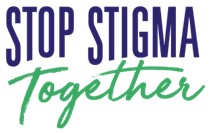 Stop Stigma Together is working to unite organizations to create resources, generate funding, bring clarifying awareness, and address the issues around mental health and substance use disorders. They will pose a grand challenge to our friends, family, employers, healthcare providers and governments to end the stigma around mental health and substance-use disorders to establish true well-being.
Stop Stigma Together is working to unite organizations to create resources, generate funding, bring clarifying awareness, and address the issues around mental health and substance use disorders. They will pose a grand challenge to our friends, family, employers, healthcare providers and governments to end the stigma around mental health and substance-use disorders to establish true well-being. -
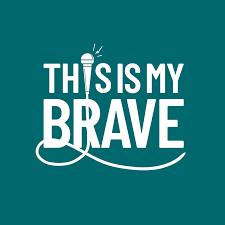 This is My Brave is a storytelling theatre show where individuals from the community share their stories of living a successful life despite mental illness. Since 2014, This Is My Brave has produced nearly 800 storytellers sharing true, personal stories on overcoming depression, anxiety, bipolar disorder, PTSD and other illnesses. In spring 2020, the organizers developed BraveTV to bring stories of hope online during the COVID-19 pandemic.
This is My Brave is a storytelling theatre show where individuals from the community share their stories of living a successful life despite mental illness. Since 2014, This Is My Brave has produced nearly 800 storytellers sharing true, personal stories on overcoming depression, anxiety, bipolar disorder, PTSD and other illnesses. In spring 2020, the organizers developed BraveTV to bring stories of hope online during the COVID-19 pandemic. -
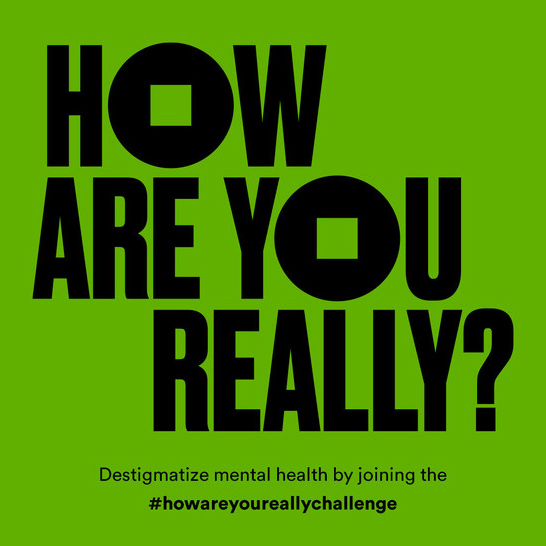 One recent effort is the Mental Health Coalition, spearheaded by Kenneth Cole in partnership with handful of partners. Partner organizations and celebrities include Active Minds, NAMI, The JED Foundation, Anxiety and Depression Association of America, Kendall Jenner, Kesha, and others. The focus of the coalition is fighting stigma through the sharing of stories with the tag line "How are you really?"
One recent effort is the Mental Health Coalition, spearheaded by Kenneth Cole in partnership with handful of partners. Partner organizations and celebrities include Active Minds, NAMI, The JED Foundation, Anxiety and Depression Association of America, Kendall Jenner, Kesha, and others. The focus of the coalition is fighting stigma through the sharing of stories with the tag line "How are you really?" -
 Bring Change to Mind is a nonprofit organization focused on encouraging dialogue about mental health and raising awareness, understanding, and empathy. Actress and activist Glenn Close co-founded Bring Change to Mind in 2010 after her sister and nephew were diagnosed with mental illnesses. It offers resources and tools to learn more and take action to reduce stigma.
Bring Change to Mind is a nonprofit organization focused on encouraging dialogue about mental health and raising awareness, understanding, and empathy. Actress and activist Glenn Close co-founded Bring Change to Mind in 2010 after her sister and nephew were diagnosed with mental illnesses. It offers resources and tools to learn more and take action to reduce stigma. -
 NAMI's StigmaFree campaign is working to end stigma and create hope for those affected by mental illness: "Through powerful words and actions, we can shift the social and systemic barriers for those living with mental health conditions." As part of the campaign, people can take a stigma quiz at CureStigma.org and learn more about becoming stigma free.
NAMI's StigmaFree campaign is working to end stigma and create hope for those affected by mental illness: "Through powerful words and actions, we can shift the social and systemic barriers for those living with mental health conditions." As part of the campaign, people can take a stigma quiz at CureStigma.org and learn more about becoming stigma free. -
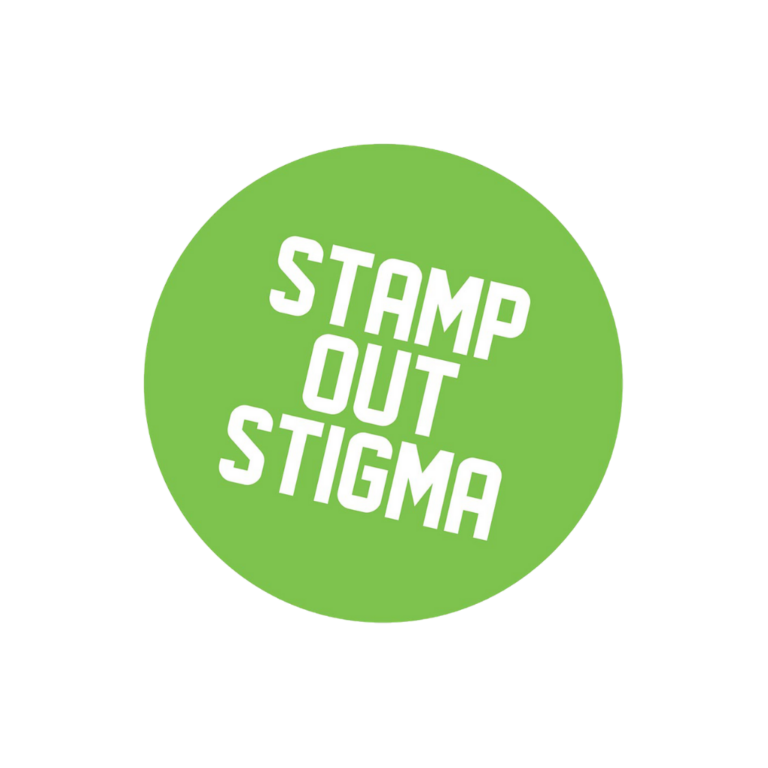 Stamp Out Stigma is an initiative spearheaded by the Association for Behavioral Health and Wellness to reduce the stigma surrounding mental illness and substance use disorders. The campaign encourages people to start the conversation and to talk openly about mental illness and substance use.
Stamp Out Stigma is an initiative spearheaded by the Association for Behavioral Health and Wellness to reduce the stigma surrounding mental illness and substance use disorders. The campaign encourages people to start the conversation and to talk openly about mental illness and substance use. -
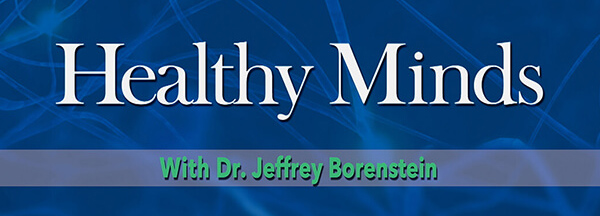 Healthy Minds with Dr. Jeffrey Borenstein aims to remove the stigma of mental illness and demonstrate that with help, there is hope. The series focuses on common psychiatric conditions through inspiring personal stories, as well as, experts sharing cutting edge information, including new approaches and next-generation therapies in diagnostics, treatment and research. Series is produced by the Brain & Behavior Research Foundation.
Healthy Minds with Dr. Jeffrey Borenstein aims to remove the stigma of mental illness and demonstrate that with help, there is hope. The series focuses on common psychiatric conditions through inspiring personal stories, as well as, experts sharing cutting edge information, including new approaches and next-generation therapies in diagnostics, treatment and research. Series is produced by the Brain & Behavior Research Foundation.
How So We Stop Stigma? Conversation
Try these simple tips for talking.
Do Say
- "Thanks for opening up to me."
- "Is there anything I can do to help?"
- "I'm sorry to hear that. It must be tough."
- "I'm here for you when you need me."
- "I can't imagine what you're going through."
- "People do get better."
- "Oh man, that sucks."
- "Can I drive you to an appointment?"
- "How are you feeling today?"
- "I love you."
Don't Say
- "It could be worse."
- "Just deal with it."
- "Snap out of it."
- "Everyone feels that way sometimes."
- "You may have brought this on yourself."
- "We've all been there."
- "You've got to pull yourself together."
- "Maybe try thinking happier thoughts."
Source: MakeItOK.org
- Amsalem, D. et al. 2023. Stigma Reduction Via Brief Video Interventions: Comparing Presentations by an Actor Versus a Person With Lived Experience. Psychiatric Services. https://doi.org/10.1176/appi.ps.20230215
- APA News Release: Employees Say Workplaces Are Offering Fewer Mental Health Services in 2022, According to APA Poll. May 22, 2022.
- Barnett, D. 2023. ‘Tis the Season: Opportune Time to Help Reduce Stigma of Substance Use Disorders Psychiatric News. Nov. 27, 2023. https://doi.org/10.1176/appi.pn.2023.12.12.35
- Center for Workplace Mental Health. Working Well Toolkit. 2016.
- Collins, R.L., et al. Social Marketing of Mental Health Treatment: California's Mental Illness Stigma Reduction Campaign. Am J Public Health. 2019 June; 109(Suppl 3): S228–S235.
- Corrigan, Pw, Druss, BG, Perlick, DA. The Impact of Mental Illness Stigma on Seeking and Participating in Mental Health Care. Psychological Science in The Public Interest. 2014, 15(2);37-70.
- da Conceição, V., Mesquita, E., & Gusmão, R. (2023). Effects of a stigma reduction intervention on help-seeking behaviors in university students: A 2019-2021 randomized controlled trial. Psychiatry research, 331, 115673. Advance online publication. https://doi.org/10.1016/j.psychres.2023.115673
- Forde, K. 2020. By Sharing Their Own Struggles, Celebs Help Teens Tear Down Mental Health Stigma.
- Greenstein, L. 9 Ways To Fight Mental Health Stigma. NAMI blog, Oct. 11, 2017.
- Hope Lab, Common Sense, and California HealthCare Foundation. 2021. Coping With Covid-19: How Young People Use Digital Media To Manage Their Mental Health.
- Mayo Clinic. Mental health: Overcoming the stigma of mental illness. 2017.
- McLean/Mass General Brigham, 2023. Let’s Face It, No One Wants To Talk About Mental Health
- Oexle N, Müller M, Kawohl W, et al. Self-stigma as a barrier to recovery: a longitudinal study. European Archives of Psychiatry and Clinical Neuroscience. October 2017. doi: 10.1007/s00406-017-0773-2.
- Pescosolido, BA. The public stigma of mental illness: what do we think; what do we know; what can we prove? J Health Soc Behav. 2013 Mar;54(1):1-21. doi: 10.1177/0022146512471197.
- Scarf, D., et al. Association of Viewing the Films Joker or Terminator: Dark Fate With Prejudice Toward Individuals With Mental Illness. JAMA Network Open. April 24, 2020.
- Yanos, P., Amsalem, D., Dixon, L. 2023. Brief video interventions to reduce self-, public, and affiliate stigma among/toward young individuals with psychosis. Presentation at APA 2023 Mental Health Services Conference
Physician Review
Nikhita Singhal, M.D.
University of Toronto, Psychiatry Resident
March 2024
